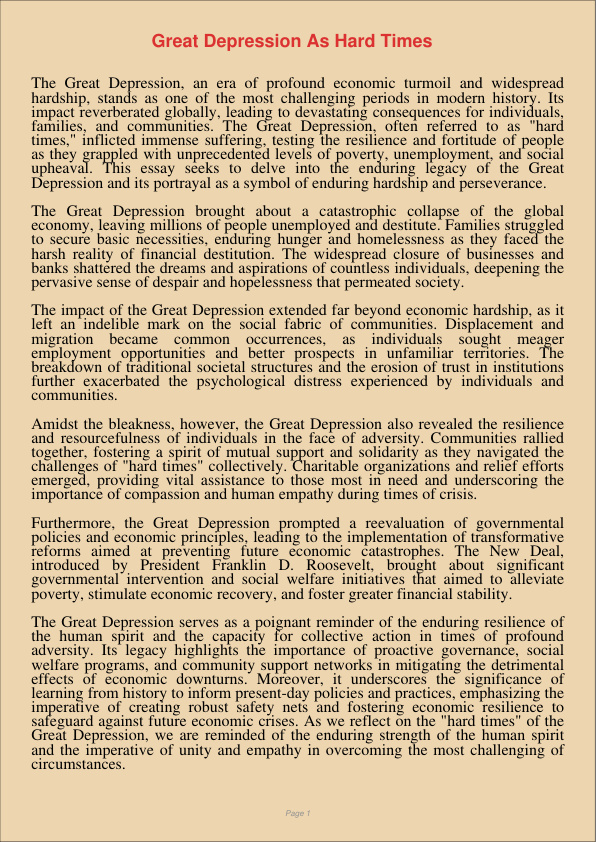Great Depression As Hard Times
Jan 12, 2024
hard times
great depression
Sociology
Philosophy

The Great Depression, an era of profound economic turmoil and widespread hardship, stands as one of the most challenging periods in modern history. Its impact reverberated globally, leading to devastating consequences for individuals, families, and communities. The Great Depression, often referred to as “hard times,” inflicted immense suffering, testing the resilience and fortitude of people as they grappled with unprecedented levels of poverty, unemployment, and social upheaval. This essay seeks to delve into the enduring legacy of the Great Depression and its portrayal as a symbol of enduring hardship and perseverance.
The Great Depression brought about a catastrophic collapse of the global economy, leaving millions of people unemployed and destitute. Families struggled to secure basic necessities, enduring hunger and homelessness as they faced the harsh reality of financial destitution. The widespread closure of businesses and banks shattered the dreams and aspirations of countless individuals, deepening the pervasive sense of despair and hopelessness that permeated society.
The impact of the Great Depression extended far beyond economic hardship, as it left an indelible mark on the social fabric of communities. Displacement and migration became common occurrences, as individuals sought meager employment opportunities and better prospects in unfamiliar territories. The breakdown of traditional societal structures and the erosion of trust in institutions further exacerbated the psychological distress experienced by individuals and communities.
Amidst the bleakness, however, the Great Depression also revealed the resilience and resourcefulness of individuals in the face of adversity. Communities rallied together, fostering a spirit of mutual support and solidarity as they navigated the challenges of “hard times” collectively. Charitable organizations and relief efforts emerged, providing vital assistance to those most in need and underscoring the importance of compassion and human empathy during times of crisis.
Furthermore, the Great Depression prompted a reevaluation of governmental policies and economic principles, leading to the implementation of transformative reforms aimed at preventing future economic catastrophes. The New Deal, introduced by President Franklin D. Roosevelt, brought about significant governmental intervention and social welfare initiatives that aimed to alleviate poverty, stimulate economic recovery, and foster greater financial stability.
The Great Depression serves as a poignant reminder of the enduring resilience of the human spirit and the capacity for collective action in times of profound adversity. Its legacy highlights the importance of proactive governance, social welfare programs, and community support networks in mitigating the detrimental effects of economic downturns. Moreover, it underscores the significance of learning from history to inform present-day policies and practices, emphasizing the imperative of creating robust safety nets and fostering economic resilience to safeguard against future economic crises. As we reflect on the “hard times” of the Great Depression, we are reminded of the enduring strength of the human spirit and the imperative of unity and empathy in overcoming the most challenging of circumstances.